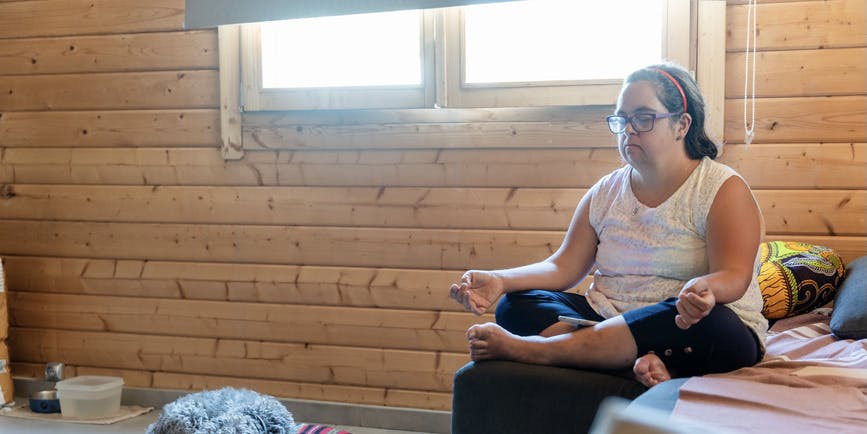
When it’s time to learn new things

Topics
Life is all about perspective, right? How we view a problem—or how someone views us—can shape the choices we make + paths we take. And with a little more knowledge, we can learn new skills + get better treatment for a variety of health conditions.
This week, let’s review a few new perspectives on old health issues. Here’s how feeling meh can be a form of less-understood depression, why clinicians are shifting how they treat people with obesity + how to feel good while you suck at something new.
Then, we’ll close with news on the first gene-editing treatment + how mood can affect vaccine response. But first, get your…
- Checkup: T Swift + exercise + healthier cookies
- Updated: body size + meh
- new things
- Healthcare: gene editing + more virus news
The Checkup
- Why do headaches and migraines happen in more women than men?
- These everyday holiday items can be dangerous for your pets
- Here’s how Taylor Swift got in shape for her grueling 3-hour concerts
- New studies suggest full-fat dairy products might be the healthiest
- Here’s when + how to use sleeping pills without destroying your sleep
- Do you have the flu, Covid-19 or RSV? How to tell which virus you have
- Why jumping rope is a perfect indoor and winter cardio routine
- Nutritionists share brilliant hacks to make holiday cookies healthier
Meh can be depression, too

If you’re overwhelmed by the state of the world, therapists at Self share excellent coping tips to improve your mental health.
But if you’ve felt meh for a long, long time? You may have dysthymia.
This mild form of persistent depressive disorder (PDD) includes feeling flat, numb or low-level sadness all day, on more days than not, for at least two years. People with dysthymia can generally fulfill daily responsibilities, so they may believe their lack of luster is a personality trait—not a medical condition. But poor appetite, insomnia + other symptoms can develop as a result.
Learn more about this underdiagnosed condition at the New York Times.
And if you just need some pep back in your step…
Enjoy being bad at something

According to Vox, we humans are not great at giving ourselves time to learn new things. Sure, we all have different learning styles and trying + discarding new hobbies is a part of life. But our societal drive for perfection + penchant to perform on social media means we often don’t enjoy the learning process… which should be the point, right?!
Before you embark on learning a new language or skill set aimed at greater health + happiness, here's how to prioritize bringing delight into the process.
- Identify your motivation: Knowing why we want to learn something can help us savor the process so that we won’t beat ourselves up if we don’t immediately nail the product. It can also make us less judgmental of ourselves and others, which encourages friends + family members to share their relevant expertise.
- Establish a growth mindset. A fixed mindset means we view abilities as innate + unchangeable. A growth mindset understands that hard work, support + flexibility help us learn with time. Adapting this mindset is an important part of learning new things.
- Embrace vulnerability. It's common to feel vulnerable when out of our comfort zone. But discomfort can be a sign of growth. The more we accept + embrace the struggle, the more likely we are to carry on diving into our new habits or hobbies whenever we have some free time.
Health at every size

Research shows that when physicians suggest weight loss as a primary treatment option, patients suffer—especially those with larger bodies. They often go without proper diagnosis or treatment. Or they avoid routine care because they’ve been disregarded or disbelieved in the past.
Realizing this problem, more providers are starting to practice weight-inclusive or weight-neutral care. Instead of (wrongly) assuming that weight loss cures all ills, they focus on specific risk factors + genetic predispositions. And they take a respectful, sensitive and nuanced approach to movement and diet.
Dr. B covered weight stigma in prior newsletters. So we’re thrilled by this shift.
Learn more at NPR.
Healthcare 411
FDA approves first gene-editing treatment for human illness (NPR). On Friday, the FDA approved two gene therapies for those with sickle cell disease—a life-threatening blood disorder. One involves removing bone marrow cells, editing a gene, and infusing the modified cells into patients. The treatment resolved severe pain for at least 18 months in 97% of trial participants. It’s expensive + not accessible for most. But it’s hope!
CDC director recommends masking against tide of rising respiratory illnesses (Salon). CDC director Mandy Cohen says we’re not seeing new respiratory illnesses. But Covid-19, flu and pneumonia cases are rising + RSV may be peaking. On top of vaccination, improving indoor ventilation and washing hands, Cohen again recommends masking in public. If you get the flu or Covid-19, Dr. B can help you get same-day treatment without leaving home. Our online healthcare is available 365 days a year—holidays included!—with a $15 online consultation.
Explore our online primary care
Why your mood could affect your flu shot (WaPo). New studies suggest that people in a good mood produce more antibodies after their flu shot. Sleep-deprived participants create half the response—so sleeping well the night before a jab can help. Healthy gut flora encourages a good response while antibiotic use lowers it. Read the article for specific pre-vaccine tips.
Topics
Sign up for the free Dr. B newsletter for a weekly report on the latest in healthcare + research-based advice for staying healthy and mentally well.